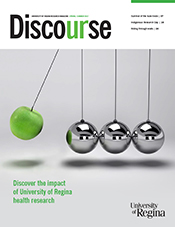Ian Quach, Paul Hewitt, Taylor Petrychyn, and Maksym Zabutnyy with medals and trophies from their recent podium finishes at both the Western and Canadian Engineering Competitions. (Photo by Michael Bell)

Hackathons – collaborative computer programming events – provide opportunities for aspiring software engineers to improve their problem-solving and coding skills as they attempt to find innovative solutions to problems.
University of Regina undergraduate software systems engineering students Maksym Zabutnyy, Ian Quach, Taylor Petrychyn, and Paul Hewitt have honed their skills over many hackathons.
This year, those skills won them the right to compete in the programming division at the national level at the Canadian Engineering Competition (CEC). They came home with third place in the programming division, a huge achievement that shows that Regina can compete with the best.
The team hopes their win will inspire other engineering students to participate in competitions.
“Hopefully it sparks interest, because there are other people who absolutely can display their skills at the regional or national level,” Zabutnyy says.
To compete nationally, the team first had to win at the Regina Engineering Competition, then place first or second at the regional level. They placed first in their division at the Western Engineering Competition (WEC) at the University of Manitoba.
At WEC, programming teams had to create a simulation to clear a snow-covered parking lot that had unknown catch-basin locations, without hitting any of the basins.

At the national competition, held at the University of Waterloo, they competed with the top teams from across Canada. Teams were given eight hours to program a robot that could clean a restaurant automatically and efficiently.
“The big challenge was getting the computer to think for itself and make its own decisions because we weren’t allowed to send any commands. We just had to click a button and let it go,” Hewitt says. “No matter what kind of map it got or what kind of restaurant it got put in, the robot had to figure out the most efficient way to scan for garbage, locate it, and sort it.”
“I will always remember the time we went to Waterloo to compete against all the other engineering schools in Canada, and our team ended up third on the podium,” Hewitt says. “It was pretty cool.”
At the same time, the team had to develop their “product pitch” for the judges. Their goal was to emphasize real-life uses for the product they developed.
Petrychyn says theirs was the only team that built a user-interface that would allow someone to visually track the robot’s progress.
“If you were a restaurant manager – that’s who we were selling it to – you could actually run it,” he says. “Because a software engineer is not going to be the one running the garbage robot every night at a restaurant.”
The students say participating in competitions and hackathons gives them new skills and increased confidence as they move into the job market.
“What I got out of CEC, and all the competitions we have been doing together, is a better sense of where my skills are lacking and how I can improve upon them. Now I have a goalpost I can strive towards,” Quach says.
Plus it’s fun.
“I will always remember the time we went to Waterloo to compete against all the other engineering schools in Canada, and our team ended up third on the podium,” Hewitt says. “It was pretty cool.”

















